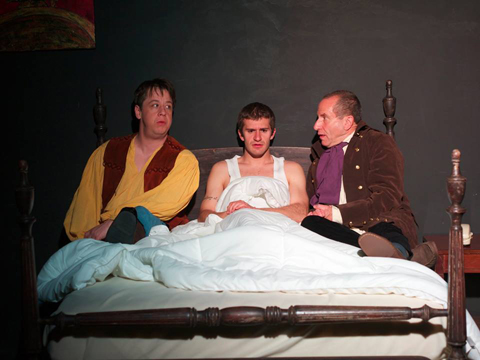
I IS ANOTHER Bobby, Puppi, and Clement as various Priors. [Photo by C.T. Larsen] |
It doesn’t hurt that Angels In America is, in several regards, the greatest American play ever written. And judging from the Epic Theatre Company production of the first part, audiences are being gifted with a magnificent, definitive production (through June 29 at Theatre 82), perfectly cast and directed by Ashley Arnold and Kevin Broccoli.
Playwright Tony Kushner’s masterwork, which snapped up a Pulitzer in 1993, is so audaciously ambitious in all it spans that it needed to be presented in two three-hour-plus sections. Subtitled “A Gay Fantasia On National Themes,” Part I is titled Millennium Approaches, and Perestroika is Part II. Its primary subject is, of course, the “plague” that began decimating the gay community in the early 1980s. We begin by seeing how HIV and AIDS affect a typical couple, Louis Ironson (Kevin Broccoli) and Prior Walter (Michael Puppi), when the latter starts noticing his Kaposi sarcoma lesions, early indicators of immune system failure.
Appropriate for a subject so emotionally fraught, the play opens at a brief fevered pitch, with a nearly hysterical Prior in bed, having imagined an angel above him about to herald some auspicious pronouncement. Another such scene ends Part I.
Louis is too well-drawn to be a mere placeholder for society’s neglect of those felled by AIDS, but he does serve as that metaphor. Louis anticipates not being able to cope with the illness of his partner of four years, and he’s right. He tries out on a rabbi (Mary Paolino) his rationalizations for abandoning Prior, but he remains guilty and self-centered as self-charged. Prior, scion of a pre-Mayflower family, has to settle for hallucinatory consolation from three prior Priors who tell him of plagues in their own times.
Near the beginning, we get to the moral fulcrum of the plot, a meeting of ethical opposites in our society: upright Mormon Pitt being offered a Justice Department job by his mentor, Roy Cohn (R. Bobby), who is nearly satanic in a comical way, with his volcanic hubris and all-consuming grasp (“I wish I was an octopus, a fucking octopus. Eight loving arms and all those suckers, know what I mean?”). Cohn obviously wants a compliant minion. Naïve goodness doesn’t stand a chance in these chambers of power.
Cohn was an actual historical figure, the powerful conservative acolyte of Sen. Joseph McCarthy. To his last breath, he insisted publicly that the disease wasting him away was liver cancer. He can’t be a homosexual, he insists, since they “don’t have clout.” So, as he puts it, “Roy Cohn is a heterosexual man who fucks around with guys.”
Underscoring such denial rampant among closeted gays, there also is Joe Pitt (C.T. Larsen) — a Mormon, no less — coming to anguished terms with who he is, wracked with guilt. He eventually hooks up with Louis, who would rather hate himself for fleeing than be there for his sick partner. Larsen is transfixing, yet the characterization psychologically is shaky. Nonetheless, self-hatred seems a likely prompt for Pitt’s anonymous sex in Central Park.